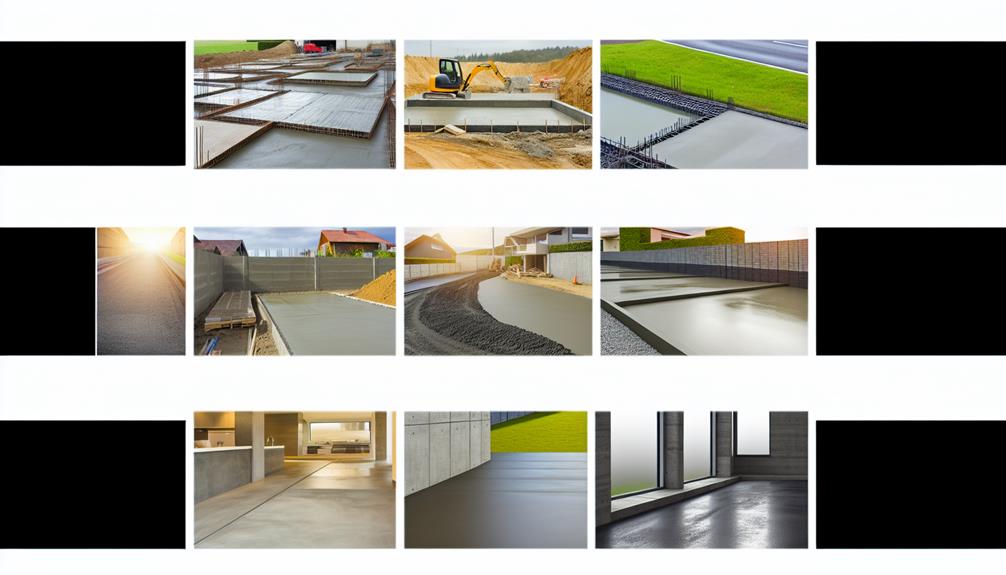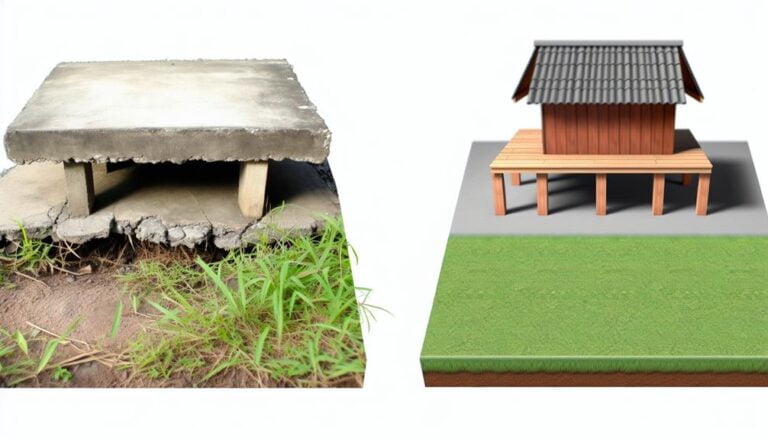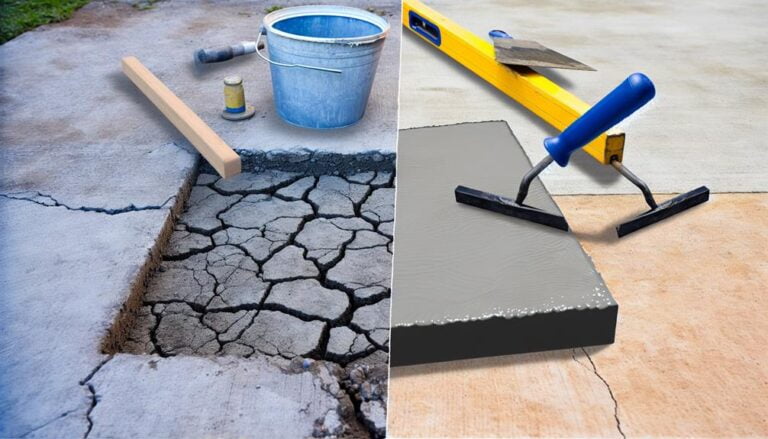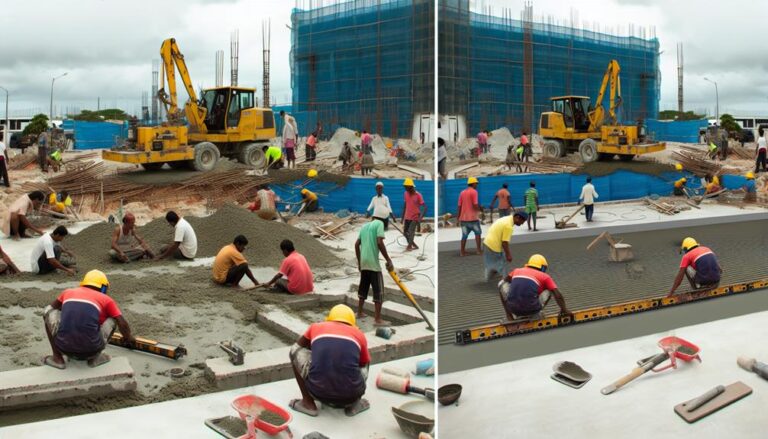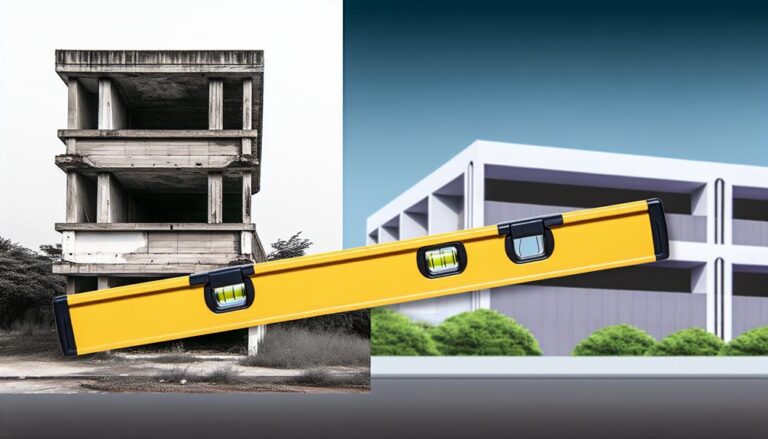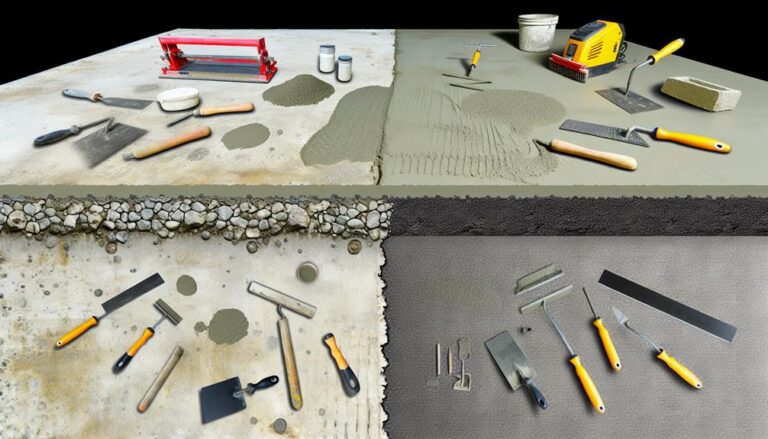Top 10 Benefits and Applications of Concrete Leveling
Concrete leveling offers ten key benefits and applications. It improves safety and functionality by creating level surfaces, reducing accident risks. Eco-friendly, it reuses materials, slashing your carbon footprint. It's cost-effective, a sound solution that's much cheaper than complete replacement. Durability and longevity are hallmarks, limiting the need for regular repairs. Crucial in construction and infrastructure, it finds use in flooring, foundation repair, roads, bridges, and airport runways. For both residential and commercial projects, concrete leveling enhances value by rectifying uneven surfaces. Innovations like 3D concrete printing herald the future. Intrigued? Dive further for a deeper understanding.
Understanding Concrete Leveling
To fully appreciate the benefits of concrete leveling, you need to grasp what this process entails and how it works. At its core, concrete leveling is a method of correcting uneven concrete surfaces by altering the foundation that the surface sits upon.
Imagine you've got a lumpy, uneven yard. You wouldn't just pour more dirt over the lumps and hope for the best, would you? Of course not. You'd address the root of the problem by filling in the dips and smoothing out the bumps. That's essentially what concrete leveling does.
Here's how it works: a mixture, typically made of cement, sand, and ash, is pumped under the concrete slab. As the mixture fills the voids and starts to harden, it raises the concrete to the desired level. The process is precise, controlled, and avoids the need for a complete tear-out and replacement of the concrete.
Importance of Level Concrete Surfaces
Having level concrete surfaces isn't just about aesthetics; it's crucial for safety and functionality as well. Picture walking on a slanted, uneven patio. You'd constantly be worrying about tripping or falling. Now imagine that same scenario in a commercial setting like a warehouse or a store. The risks and potential liability issues skyrocket.
Not only is it safer to have level concrete, but it's also more functional. If you're driving a forklift in a warehouse, you want the ground beneath you to be as flat as possible. It's not just about making your job easier; it can also prevent accidents. This is especially important in industrial settings where heavy machinery is in use.
And let's not forget about your home. Uneven concrete can lead to significant damage over time. It can cause cracks in your walls, disrupt your plumbing, and even damage your foundation. By leveling your concrete, you're not just improving the look of your property, you're also preserving its structural integrity. So, don't underestimate the importance of level concrete surfaces. Your safety, productivity, and investment depend on it.
Environmental Benefits of Concrete Leveling
Beyond the safety and structural benefits, concrete leveling also packs a punch for the environment. You see, when concrete slabs become uneven, they're often replaced entirely. This process, while effective, consumes a lot of energy and resources, as well as generating waste. With concrete leveling, you're not sending chunks of concrete to the landfill. Instead, you're reusing what's already in place, thus reducing your carbon footprint.
Moreover, many concrete leveling methods use environmentally friendly materials. For instance, polyurethane foam used in foam jacking is made of recycled materials. It doesn't produce harmful emissions, and it's highly durable, reducing the need for future repairs.
On top of that, concrete leveling also helps in water conservation. When concrete is uneven, rainwater doesn't drain well, leading to wastage. But a leveled surface ensures proper water runoff, preventing puddles and reducing water wastage.
Cost-Effective Aspect of Concrete Leveling
Another compelling advantage of concrete leveling is its cost-effectiveness, which can be a real game-changer for your budget. Unlike other solutions like total concrete replacement, concrete leveling doesn't demand a hefty investment. It's a more affordable process that won't burn a hole in your pocket.
Apart from being easier on your wallet, it also saves you valuable time. It typically takes less time to level an existing concrete slab than to remove and replace it. Therefore, you're not only saving money, but you're also saving time – a precious resource that you can't buy back.
Let's break down the cost-effectiveness of concrete leveling in the table below:
| Cost Factor | Concrete Leveling | Concrete Replacement |
|---|---|---|
| Material Cost | Lower | Higher |
| Labor Cost | Lower | Higher |
| Time Cost | Lower | Higher |
| Disposal Cost | Lower | Higher |
| Total Cost | Lower | Higher |
As you can see, across all cost factors, concrete leveling proves to be more cost-effective. It's a practical solution that gives you good value for your money without compromising on quality. Therefore, if you're looking for an economical yet effective way to fix your concrete problems, concrete leveling should be your go-to choice.
Improved Longevity With Concrete Leveling
Not only is concrete leveling cost-effective, but it also significantly enhances the longevity of your concrete surfaces. By leveling your concrete, you're providing a solid, durable base that can withstand the test of time. This technique eliminates the need for frequent repairs, saving you both time and money in the long run.
Why's this? Well, uneven surfaces often lead to cracks, fissures, and other forms of damage. These imperfections not only degrade the aesthetic appeal of your property but also weaken the concrete structure, reducing its lifespan. Concrete leveling addresses these issues by creating a smooth, flat surface that's more resistant to wear and tear.
Furthermore, concrete leveling helps to prevent the accumulation of water on your surfaces. Pooled water can seep into unsealed cracks and freeze during colder months. This expansion and contraction process can cause further damage to your concrete. By ensuring your surfaces are level, you're helping to mitigate this issue, promoting long-term durability.
In short, concrete leveling isn't just a quick fix. It's an investment in the future of your property. It's about making sure that your concrete surfaces stand up to whatever life throws at them, for as long as possible.
Concrete Leveling in Construction Industry
In the construction industry, concrete leveling plays a pivotal role in ensuring the integrity and longevity of structures. It's an essential process that corrects uneven concrete surfaces by altering the foundation they sit on. As a professional in this field, you're likely to appreciate the importance of this practice in various construction tasks.
Here are some key applications of concrete leveling in the construction industry:
- Flooring: Uneven floors can be hazardous and unsightly. Concrete leveling is often used to rectify this issue, providing a smooth, level surface for final floor finishes.
- Foundation Repair: Over time, building foundations can sink or become uneven. Concrete leveling can stabilize the foundation, extending the lifespan of the structure.
- Road Construction: Concrete leveling ensures roads are smooth and safe for vehicles. It's a cost-effective solution to prevent early wear and tear on the roads.
- Patio and Driveway Construction: Concrete leveling can help in creating even surfaces for patios and driveways, enhancing the aesthetic appeal and functionality of these areas.
Applications in Infrastructure Development
When it comes to infrastructure development, you'll find concrete leveling instrumental in creating robust and long-lasting structures. It's an essential process that ensures the evenness and stability of infrastructural projects like roads, bridges, and even airport runways. You can't underestimate the importance of a smooth and level surface in such constructions.
Concrete leveling is also critical in the construction of dams and other water-related infrastructure. It helps to mitigate problems like water seepage and erosion, ensuring the longevity of these structures.
Now, let's take a look at this table to illustrate some of the key applications of concrete leveling in infrastructure development.
| Infrastructure | Importance of Concrete Leveling |
|---|---|
| Roads & Bridges | Ensures smoothness and stability, reducing maintenance costs in the long run. |
| Airport Runways | Critical for safety; uneven surfaces can cause accidents during take-off or landing. |
| Dams | Prevents water seepage and erosion, increasing structure's lifespan. |
| Water-related Infrastructure | Ensures stability and durability, preventing potential damages and repair costs. |
Concrete Leveling in Residential Projects
Transitioning to residential projects, you'll find that concrete leveling plays a pivotal role in ensuring the stability and longevity of homes, apartments, and other housing structures. It's not just about aesthetics; it's about safety, durability, and, ultimately, the value of your property.
With concrete leveling, you can:
- Correct uneven concrete surfaces: This prevents trip hazards, ensuring safety for occupants and visitors.
- Reduce water pooling: Concrete leveling eliminates areas where water can gather, reducing the risk of water damage.
- Extend the life of your concrete: By addressing issues early, you maintain the integrity of the concrete, saving you costly repairs down the line.
- Enhance property value: A well-maintained home, including level concrete, can significantly boost your home's value.
In essence, concrete leveling is a preventative measure that safeguards your home from potential issues, ensuring it remains a comfortable, safe, and valuable place to live. So, whether you're a homeowner or a property developer, don't underestimate the role of concrete leveling in residential projects. It's a small task that can make a massive difference in the long run.
Commercial Use of Concrete Leveling
Just as it's crucial in residential settings, concrete leveling also holds significant importance in commercial projects, offering stability and longevity to businesses and public buildings. Imagine you're a business owner, and your premises have uneven floors or sunken concrete. Not only does it present a safety hazard, but it can also negatively impact your business's image. Concrete leveling is your go-to solution, rectifying these issues swiftly and with minimal disruption.
In commercial settings, time is money. Concrete leveling techniques, such as slab jacking or polyjacking, can be completed quickly, allowing your business operations to continue with minimal downtime. Moreover, these methods are cost-effective compared to full concrete replacement, helping you keep those overhead costs in check.
Lastly, it's about durability. Concrete leveling extends the lifespan of your concrete surfaces, reducing the need for frequent repairs. This means less maintenance hassle for you, and more time focusing on what matters most – your business.
In a nutshell, commercial concrete leveling offers you a safe, cost-effective, and durable solution for your concrete issues. So, next time you spot an uneven surface, remember, there's a practical and efficient solution at hand.
Future Innovations in Concrete Leveling Techniques
Looking ahead, you'll find that innovative techniques in concrete leveling promise to bring even more efficiency and cost savings to this critical aspect of building maintenance. The future of this industry is shaping up to be quite exciting as the focus isn't just on improving techniques but also on making them more sustainable.
Here are some of the promising innovations you should keep your eye on:
- 3D Concrete Printing: This technology uses a computer-controlled robotic arm to deposit concrete layer by layer, promising precision in leveling.
- Self-healing Concrete: Bacteria are embedded into the concrete, which can produce limestone when activated by water, effectively self-repairing cracks.
- CarbonCure Technology: This technique involves injecting recycled CO2 into the concrete, which then solidifies, strengthening the concrete and reducing its carbon footprint.
- Graphene Concrete: Graphene, a super-strong and lightweight material, is being added to concrete to improve its strength and durability.
With these advancements, you can expect future concrete leveling techniques to not only be more efficient and cost-effective, but also much more environmentally friendly. The future surely looks bright for this industry!
Frequently Asked Questions
What Type of Training or Certification Is Required for Professionals Performing Concrete Leveling?
You're likely curious about the training for concrete leveling professionals. They need a solid understanding of construction principles, often gained through vocational training or apprenticeships.
Certification isn't always required, but it's beneficial. The American Concrete Institute offers a Concrete Flatwork Associate certification. You'd need to pass an exam demonstrating your knowledge in concrete mixing, placing, and finishing.
Continuing education is also crucial, as technology and techniques constantly evolve.
Are There Any Safety Concerns or Precautions That Need to Be Considered During the Concrete Leveling Process?
Yes, safety is paramount in the concrete leveling process. You must wear proper protective gear, including gloves and safety glasses.
Be careful when handling the leveling equipment as it can be heavy and cause injury. Also, the area should be clear of any obstructions that could pose a risk.
How Does Weather or Climate Impact the Process or End Result of Concrete Leveling?
Weather impacts concrete leveling significantly. If it's too cold, concrete may not set properly. Conversely, extreme heat can cause it to dry too quickly, leading to cracking.
Rain can also be problematic, as it can wash away or dilute the concrete before it has a chance to dry.
Can Concrete Leveling Be Done as a DIY Project or Does It Require Professional Intervention?
You're wondering if concrete leveling can be a DIY project or if it needs a pro's touch.
It's possible to do it yourself with the right tools and knowledge, but it's not recommended.
It's a complex process, requiring precision and expertise.
You don't want to risk a poor job that could lead to bigger issues down the line.
Are There Any Notable Brands or Companies That Specialize in Concrete Leveling Equipment or Services?
You're on the right track asking about noteworthy brands in concrete leveling. A-1 Concrete Leveling and HMI are two top contenders in this industry.
A-1 is renowned for their eco-friendly methods and HMI offers training for DIY enthusiasts. Remember, it's crucial to research and choose the best-suited company for your specific needs.
These giants in the field have proven track records, but it's always smart to review your options.
Conclusion
Concrete leveling, like a solid foundation, assures you of a steady ground beneath your feet. It's your cost-effective solution to uneven surfaces, a silent warrior in the battle against environmental harm, and a key player in infrastructure growth.
And whether you're building your dream home or a commercial skyscraper, concrete leveling is your unwavering ally. So, as we look to the future, let's embrace the innovations in this field, opening the door to more sustainable, reliable construction.
